A chronicle of all things fun - eating, drinking, traveling... plus the occasional ranting
November 27, 2021
The ultimate home banquet
At a dinner a few weeks ago, I was received a coveted invitation to join Dashijie (大師姐) at one of her home banquets. I had to reluctantly turn down my first invitation a few years ago, as Sankala had gotten us extremely good tickets to see John Legend play in Hong Kong. I was, frankly, surprised and flattered to receive the invitation a second time.
The home banquet was held in conjunction with Ruyi Gastronomy, which was showcasing the new Home Banquet Collection (家宴逸品). The collection of porcelain was, in fact, initially designed at the request of Dashijie - as she wanted a custom set which would work specifically for her dishes. Desmond was on hand as co-host of the evening to give us some details about these beautiful pieces.
To match the beautiful china, our hostess also laid out her collection of vintage Baccarat crystal glassware, along with an elegantly designed menu. The Chinese names of the dishes were then poetically reimagined in English by our hostess' daughter.
We were, of course, all invited to watch as our host and hostess prepared the dishes along with their little kitchen elves, but I figured I'd give the others the opportunity to go in and do their filming.
I actually spent part of the time popping open a few bottles. DaRC, Desmond, and I were trying to figure out which wines to pair with each of tonight's dishes, and I was curious to see how they would work out.
Winter melon concerto (蟹肉燕窩冬蓉羹) - we kick off with our soup in the familiar colors of red and gold, from an earlier collection.
This was then served in these beautiful bowls.
WOW! I wasn't expecting this at all... The soup - which was light-colored and clear in appearnace - packed so much flavor. We've got winter melon, bird's nest, crab meat, and a sprinkle of powdered ham on top. This wasn't just salt and simple seasoning. This was the combination of the clean, lightly sweet flavors of winter melon meshing together with the sweetness of crab meat, and the saltiness of quality Chinese ham... all coming together in harmony.
A concerto it most certainly was.
2004 Bollinger Vieilles Vignes Françaises, bottle No. 0960 - very rich, very deep flavors. Too bad we were all too thirsty and finished this bottle so quickly, before it had a chance to fully open up.
Supreme decadence (海膽戈炸) - this was a dish I had been waiting for. This old school deep-fried custard can be found at a few places around town, but I can't think of anyone who has a better recipe or who possesses the know-how better than our hostess.
And here we have, apparently, one of only two of these plates ever made. The round nubs protruding from the plate are meant to separate the bottom of these fried custards from the surface of the plate so to avoid contact, allowing any excess oil to drip away while preventing the custards from getting soggy.
I've had a few of these deep-fried custards in my time, but the ones tonight were certainly the best I've ever had. The addition of sea urchin meant that the flavors were very rich with a lot of depth. Very, very creamy texture, with a sprinkle of sugar on top.
Decadence? Mais, bien sûr!. Supreme? Absolument!
The savory flavor profile meant that they worked perfectly with the sweet Sauternes, just like our hostess said they would. The Clos Ste Hune clearly did not work as well as the Sauternes.
2010 L'Extravagance de Doisy-Daëne, en demi-bouteille - orange blossom water, honey, later some apricot. Really rich and viscous.
Golden medallions (燒金錢雞) - "gold coin chicken" is one of these old school dishes I really, really love. There are still roast meat restaurants that do this dish, as well as other restaurants focused on preserving Cantonese classics, but it is certainly something that one sees less and less. There is something inexplicably magical about putting together slices of char siu (叉燒), chicken liver, and pork fat (冰肉), alternating the medallions on skewers and then roasting them. Tonight our hostess had two extra elves to help her with the skewering.
The coins are meant to be served on some sort of bread, and tonight these medallions were cut from bread from Garden.
Looking at the liquefied fat and honey glaze glistening beautifully under the lights, I couldn't help but salivate. In fact, I would probably behave just like Pavlov's dog and drool at the mere mention of the dish. Tonight the roasting was executed perfectly, with a charred edges forming a ring delivering the right amount of crunch. I dutifully laid a portion on top of a piece of bread, but honestly, this was glorious on its own. There were wonderful flavors and fragrance coming from the Mei Kuei Lu (玫瑰露) used as marinade, which I dearly love. And as a testament to the exacting standards of our hostess, it takes the entire liver of one chicken to produce one medallion of liver - as only a specific part of the liver is used.
I resisted the temptation to pile on leftovers and shove them in my mouth in one bite. That was some other greedy pig...
1946 Massandra Sherry - served 1 hour after opening. Very oxidized and savory as expected, with lots of salty plum, but still has some sweetness on the palate.
The Sherry paired so, so fucking well with the gold coin chicken... as it was simultaneously savory and sweet, which is exactly how the dish tasted. The Guiraud - the other Sauternes tonight - also worked with this.
1989 Guiraud - opened a few hours earlier. Nice and sweet with honey, a little marmalade.
Birds of a feather (鹽焗雞配雞油飯) - I have long heard (and read, and seen pictures and videos) of our hostess' salt-baked chicken, which is done the old fashioned way and requires an enormous amount of strengh and effort. I finally had the opporunity to taste it for myself, and I cannot for the life of me remember a better salt-baked chicken than what I had. Sankala and I both have the habit of taking breast meat so that others can enjoy their dark meat, as both of us have spent time in North America getting used to chicken breast, and this chicken breast was as moist and tender as any I've had. Of course, the skin was amazing, too.
The giblets are always a welcome sight.
But the highlight must be the rice cooked with chicken fat and herbs. This was soooo delicious that I asked for another half a bowl. Rice Rice Baby got herself a whole second bowl... and there was so much rice it peeked over the top of her bowl.
1983 Trimbach Clos Sainte Hune - first pour 15 minutes after opening. Soft on the palate and slightly bitter. An hour after opening this was much more flinty and steely, with polyurethane... and starting to cross over to German riesling territory.
The flinty, mineral notes of the wine paired very, very well with the chicken. The chicken also paired reasonably well with the Guiberteau.
2016 Guiberteau Saumur Brézé - HUGE nose of toast, with plenty of acidity as expected. Was this wine trying to pretend to be a Meursault?
These pretty bowls were laid out on the lazy Susan in preparation for the next dish...
...which arrived in this beautiful soup tureen.
Ocean emperor takes flight (仙鶴神針) - the poetic name of the dish is taken from a famous martial arts novel, which fittingly describes the two main ingredients - pigeon and shark's fin. The birds are stuffed with a combination of shredded shiitake, Yunnan ham, and shark's fin - which have been simmered together.
The bones are then removed from the pigeons, leaving a flattened pile of meat and shark's fin that is ready to be served.
Our hostess knows that I don't eat shark's fin, but asked if I would have a little taste as the dish is old school and not easily available these days. I respect her for trying to ensure that the tradition of the dish carries on, so I got myself a little taste. Aside from the fin, the pigeon as well as the sauce was very, very tasty. I would have been perfectly happy to eat more if the "needles" were made of gelatin or other substitutes.
We decided to pair the dish with a very, very old Cognac, as the richness of the dish needed something a little stronger and alcoholic to cut through.
1914 Croizet Grande Réserve - with vanilla sweetness. Much softer and more elegant than expected. Apparently this was due to the fact that this vintage was made by ladies when the men went off to war, hence the softer style.
Braised sea cucumber with choy sum (蔥燒刺參) - our wonderfully considerate hostess had prepared this "off-menu" dish for the three of us who prefer not to consume shark's fin. I looooove braised sea cucumber, and the spring onion that were braised together were so, so delicious.
I really love the flavors and the textures of these spiny sea cucumbers. Very grateful to our hostess for this dish.
Oyster treasure trove (蠔豉鬆) - the dried oysters were diced and stir-fried with lots of other diced vegetables such as bamboo shoots, red and green capsicum, among others.
The lettuce which were used as "cups" were painstakingly trimmed to ensure their uniform shapes. This is where it helps to have little elves in the kitchen...
Big, big flavors here. Really loved this.
1983 Guigal La Mouline - decanted 2½ hours after opening. No more fruit left, only animal and leather, savory and almost bretty. Double-decanted 30 minutes after the first decanting, but there still wasn't much fruit on the nose, only some fruit on the palate. Also showed some smoky Chinese preserved pork. Very disappointing.
I had brought the La Mouline to pair with the dried oysters, but unfortunately the wine wasn't drinking at all the way I had wished... although, strictly speaking, the pairing still worked. The 60-year-old Taidiao, however, could not have been a better match with the dish thanks to its rich, savory notes.
60-year-old Taidiao wine (太雕酒) - really savory, showing lots of salty plum. Sooo rich and so much depth in flavors.
Jade Lagoon (上湯白菜膽) - I could not have imagined a prettier sight when this showed up at our table. The bok choy (白菜) has been meticulously trimmed so that only the hearts were cooked, and the presentation was simply stunning. Once again, the poetic name turned out to be quite fitting.
The vegetable was served with superior broth (上湯) that was so delicious that I decided to ask for more of the chicken oil rice from earlier and scooped it into the bowl of broth. Rice Rice Baby thought it was a good idea, too.
E-fu delight (乾燒伊麵) - at the request of some greedy pig, our hostess served up a noodle dish on top of the rice we had earlier.
The addition of shrimp roe absolutely made the dish. Oh, I even considered doing as the Americans would... which was serving "lo mein" on top of rice by putting the chicken oil rice next to the noodles on the plate. But I resisted the temptation.
We were served newly-harvested tea from Yunnan which came from trees that were over a thousand years old, and brewed with the addition of a few rose buds. Very, very fragrant... and the rose was clearly noticeable.
Pan Tang memories (馬蹄糕) - thanks to mom's love of the Cantonese water chestnut pudding, I've tasted my fair share of offerings from around town. This was made using water chestnuts grown in Pan Tang (泮塘).
These thick slices of pudding were so soft and wobbly, with crunchy bits of water chestnuts - which had been crushed and not sliced. Loved the flavors from caramelized sugar. This was surely the best I've ever tasted.
8 treasures (蔗汁八寶糕) - as much as I love pudding made with sugar cane juice, I was surprised that I didn't prefer this over the other pudding. Perhaps because the cane sugar didn't get caramelized. These came with lily bulb, lotus seeds, split peas, and goji (枸杞) berries.
A beautifully-arranged fruit plate, with muscat grapes, persimmon, strawberries, blueberries, and Beni Madonna (紅まどんな) oranges.
Mango ice cream - made in-house by Uncle Joe with mango from the Philippines. I LOVE THIS!
Coffee ice cream - another stunner. I love, love coffee ice cream.
The damage tonight...
I was beyond stuffed at the end of the evening, but I couldn't have been happier. For just about each dish we had tonight, one would be hard pressed to find a superior version outside our hosts' home. This was, truly and undoubtedly, the height of fine Cantonese cuisine. That I was allowed the privilege of tasting them left me humbled.
And since our kitchen is full of pure white Corelle thanks to Sankala's mom, perhaps it's time we upgraded our china...















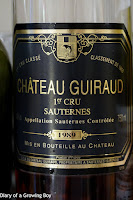




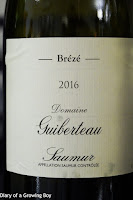





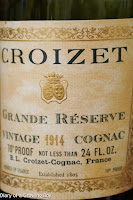





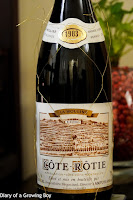






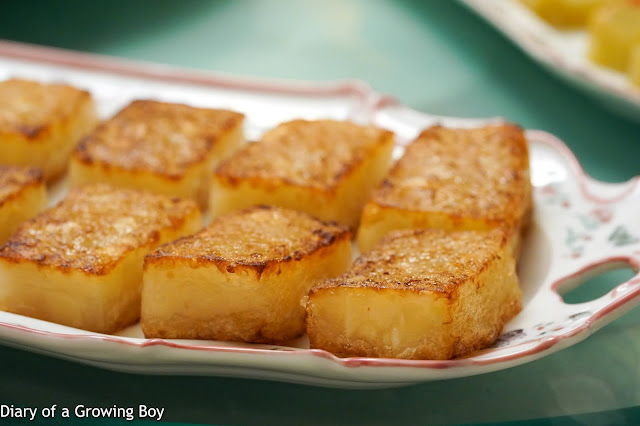






How many sharks died for that dish?
ReplyDeleteEven one is too many, which is why I don't eat shark's fin.
ReplyDelete